David Malpass resigned somewhat unexpectedly from the World Bank presidency on 15 February; he will depart the Bank in June. Speculation has been rife that this was due to the pressure on him after his comments in a New York Times panel on 23 September 2022 when he refused to acknowledge that man-made global warming is a scientific fact. Shortly thereafter, 27 Democrats from the House of Representatives signed a letter on 29 September asking for his ouster, and civil society groups contributed to the #MalpassMustGo campaign.
Malpass had long been known as a climate denier, and the Bank under his leadership has been slow to progress towards climate targets. Yet, other pressures on his leadership likely contributed to his early departure. This is a good moment to attempt an initial stocktake of his legacy.
In April 2019, Malpass inherited a Bank that was continuing to provide direct funding to fossil fuel financing. From 2015, when the Paris Agreement was signed, to 2021, they provided US$14.8 billion in support of fossil fuel projects and policy. The Bank was also deep into neoliberal financialisation thanks to the “Billions to Trillions” agenda of his predecessor, Jim Yong Kim. This aimed to leverage Bank lending by using private finance to dramatically expand investment (and debt) in developing countries. The agenda was not wildly successful but came at a time when debt was increasing across the globe. By late 2019, even Bank staffers were warning about the huge debt build-up. Malpass was concerned about this and was an advocate for debt data transparency, though this has been interpreted as a reflection of his long-term hostility towards China and hence to Chinese development finance.
This agenda came with increased funding for the Bank’s private sector arm, the International Finance Corporation, where lending transparency is much more opaque than in its main arms. In addition, there was growth in lending to private sector financial intermediaries – private equity firms, banks, etc. – where lending is opaquer again. This has prompted growing criticism from civil society organisations.
Malpass also led the Bank during the scandal over the “Doing Business” reports, which saw country ratings manipulated. Kristalina Georgieva – now International Monetary Fund (IMF) Managing Director – took the heat about it: she was found to have pressured staff to rank China more favourably. Malpass’s role in the affair is not clear, and the Bank board’s response was disappointing with few consequences. Malpass went on to revive the “Doing Business” reports under the name “Business Enabling Environment Project”, which is really not surprising as the reports reward countries that follow “right” neoliberal settings.
During the pandemic, the Bank’s financing for COVID-19 vaccines was slow though, on the plus side, they did disburse large sums fairly rapidly through country lending. Malpass personally opposed a waiver for intellectual property rights on the vaccines. The Bank refused to be part of the G20’s Debt Service Suspension Initiative during COVID-19 – though to be fair to Malpass, that is a long-standing World Bank policy. Finally, in the midst of the pandemic, where state capacity was vital to good outcomes, Bank lending continued with its privatisation-as-usual agenda.
There have been strong calls from big member states for World Bank reform in the past year. A G20 report called for adjustments to multilateral development bank (MDB) balance sheets in mid-2022 to enable greater lending. There was also a call at the COP27 climate conference for all the MDBs to develop an operational model that can address climate change. Further, the Prime Minister of Barbados, Mia Mottley, headed a team that created the Bridgetown Initiative, calling for emergency liquidity to address debt issues, increased MDB concessional lending through changing capital adequacy framework and risk assessments, and creation of a new fund to facilitate private sector investments in the green transition.
Ultimately key shareholders, including Germany and the US, called on the World Bank to produce a roadmap for reform. The draft roadmap released in January 2023 by the Bank did not provoke excitement. It suggests a series of tweaks to various Bank instruments and puts the onus back on member states to provide more capital for the International Bank for Reconstruction and Development arm and a larger replenishment for the International Development Association arm. This will now be a job for the next president.
Clearly, the Bank’s performance under Malpass has been less than stellar, but it must be said that his three immediate predecessors did not leave much of a mark on the organisation either.
The new president will face some dilemmas in trying to make the conservative lending organisation meet the expectations of member states wanting a “World Climate Bank”, while at the same time providing extra finance for poverty reduction, all without contributing to a new debt crisis. The starting issue for the “World Climate Bank” idea is that the Bank does not have a brilliant record on climate matters, and not all member states want to borrow for climate-related projects.
A more fundamental question, I think, is whether debt-based instruments are the right pathway for a green transition in the Global South. But official development assistance is hovering around just 0.33% of donor national income, and reports indicating effective declines by some key donors are always appearing. Plus, there has been no progress on measures to fund global redistribution (like the Tobin Tax), so progressive leaders in the Global South just end up calling for more lending, albeit concessional.
So, how will the new president be selected, and who might it be?
There are several pressures around the selection process. First, there is pressure to ensure the new leader has solid climate credentials, though such credentials usually need to be balanced by banking expertise for a World Bank president. Second, there is some pressure to ensure that the new president is a woman as the Bank has so far only been headed by men.
Third, there is an ongoing civil society campaign to have a merit-based selection procedure for the Bank and the IMF. In the past, thanks to a gentlemen’s agreement between the US and the Europeans, the US picked the head of the World Bank, and the Europeans the IMF. The Bank has now said that it is committed to an “open, merit-based and transparent selection process”, and is taking applications until 29 March. That was said during the last appointment, but Malpass was the only candidate. So, the chances of a truly open process are not great. The Guardian reported that the UK government accepts the next head will have a US passport.
To speculate on who might be the replacement, you need to be an expert in US Democratic politics. And it turns out that none of the initial names in the media were right, which does not surprise me because none had the right banking credentials.
The Biden Administration has nominated the Vice-Chairman of private equity firm General Atlantic, Ajay Banga. Banga also spent 12 years as head of Mastercard Inc., where he helped “500 million unbanked people join the digital economy”. In reality, debt-based “financial inclusion” for the poor is quite problematic. A meta-evaluation of randomised controlled trials on microfinance demonstrated that it has no net impact on household income: in other words at least as many people are left worse off as better off. And for those left worse off, the outcomes can be devastating, as the many thousands of suicides linked to microfinance around the globe demonstrate. Private equity firms have also done little to promote development in the Global South – indeed, their model for extracting profits, as Mariana Mazzucato’s fantastic book The Value of Everything shows, can only be called predatory.
The US is still the largest shareholder, and it is unclear if anyone else will nominate a candidate against the US nomination. It would be wonderful to see the Australian government support major shareholders, like Germany, that have been thinking about nominating an alternative.





Great post, Susan. One point though: the US, as the largest share holder, will not tolerate a non-US candidate as President of the World Bank. It really is high time that this changed but it does not seem to be on the cards
Hi Ravi, sadly that seems to be the case. I think that reflects US domestic political considerations but you’d know more about that than me! Other countries will likely continue to build alternatives where they are better represented. It is a long-term project, but these US-dominated international organisations will probably fade.
Thanks Ryan! There’s so much on microfinance it’s hard to keep up with all the literature. There are indeed some interesting alternative models, still I don’t find much evidence of those in the development bank funding I’ve studied. I’ve also written about the damaging effects of shame from microfinance, there’s still pretty strong evidence that the impacts on interpersonal relations and psychosocial wellbeing are very problematic.
Thanks for an interesting post. One minor comment. The introduction to that AEJ special issue with the microfinance RCTs is now a little outdated—and, at best, a limited frame to think about the role of credit—so I wanted to flag this recent review which gives a slightly different overall picture:
https://voxdev.org/sites/default/files/MicroFinance_Issue_1.pdf
This paper by Breza and Kinnan in the QJE is particularly important:
https://academic.oup.com/qje/article/136/3/1447/6266467